|
|
|
Sort Order |
|
|
|
Items / Page
|
|
|
|
|
|
|
| Srl | Item |
| 1 |
ID:
101748
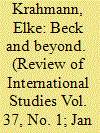

|
|
|
|
|
| Publication |
2011.
|
| Summary/Abstract |
Expanding on the works of Beck and others on the growing business of risk, this article examines the role of the private security industry in the creation, management and perpetuation of the world risk society. It observes that the replacement of the concept of security with risk over the past decades has permitted private firms to identify a growing range of unknown and unknown-unknown dangers which cannot be eliminated, but require permanent risk management. Using the discourse of risk and its strategies of commercialised, individualised and reactive risk management, the private risk industry thus has contributed to the rise of a world risk society in which the demand for security can never be satisfied and guarantees continuous profits.
|
|
|
|
|
|
|
|
|
|
|
|
|
|
|
|
| 2 |
ID:
108496
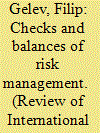

|
|
|
|
|
| Publication |
2011.
|
| Summary/Abstract |
After the terrorist attacks of 11 September 2001 Ulrich Beck placed terrorism alongside other potentially catastrophic events such as global warming, nuclear disaster, and influenza as one of the 'dimensions' of risk society. In risk society, executive governments take 'precautionary measures' and parliaments pass 'preventative laws' allowing them to accumulate information, detain terrorism suspects, freeze funds and prohibit various groups, in order to stop catastrophic risks from eventuating. International Relations and legal scholars have used risk society theory or the ideas of Michel Foucault to criticise such excesses of the executive and parliamentary branches of government. Most studies either ignore the judiciary or argue that it stands in opposition to the other branches of governments, that it imposes checks and balances in order to uphold the rule of law and protect individual rights. The article argues that this view is naïve and does not acknowledge a long history of judicial deference to the will of the executive and parliament. Through an analysis of case law from Australia and Canada the article explores parallels between early 21st century judicial reasoning and previous periods of crisis, including the Cold War, while identifying some new 'precautionary approach' aspects. The judiciary defers to the executive, asserts that the executive is more accountable than it, and seeks to avoid responsibility for engaging in this 'precautionary justice'. Furthermore, seized by the same fear of terrorism as executive governments, the judiciary shows an ability to adapt existing legal concepts to the exigencies of risk society. The article concludes that as the memory of the 9/11 attacks fades some of the most draconian preventative measures may be scaled back but the judiciary cannot be relied on to keep the executive or parliament in check.
|
|
|
|
|
|
|
|
|
|
|
|
|
|
|
|
| 3 |
ID:
160734
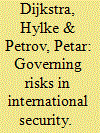

|
|
|
|
|
| Summary/Abstract |
Risks are omnipresent in contemporary international security. Despite a long tradition in security studies going at least back to Von Clausewitz, we consider that the topic of risk remains under-examined. This forum seeks to advance the research agenda on risk in security studies by showcasing work of scholars using advanced concepts of risk, based on insights from sociology, biology, psychology, and safety studies, to better understand the role of risk in international security. As a way of introduction, this short article sets out the main debates.
|
|
|
|
|
|
|
|
|
|
|
|
|
|
|
|
| 4 |
ID:
076864
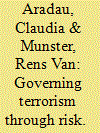

|
|
|
|
|
| Publication |
2007.
|
| Summary/Abstract |
The events of 9/11 appeared to make good on Ulrich Beck's claim that we are now living in a (global) risk society. Examining what it means to 'govern through risk', this article departs from Beck's thesis of risk society and its appropriation in security studies. Arguing that the risk society thesis problematically views risk within a macro-sociological narrative of modernity, this article shows, based on a Foucauldian account of governmentality, that governing terrorism through risk involves a permanent adjustment of traditional forms of risk management in light of the double infinity of catastrophic consequences and the incalculability of the risk of terrorism. Deploying the Foucauldian notion of 'dispositif', this article explores precautionary risk and risk analysis as conceptual tools that can shed light on the heterogeneous practices that are defined as the 'war on terror'.
|
|
|
|
|
|
|
|
|
|
|
|
|
|
|
|
| 5 |
ID:
080901
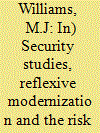

|
|
|
|
|
| Publication |
2008.
|
| Summary/Abstract |
At the dawn of the twenty-first century, the overwhelming challenge that confronts Western policy-makers is the management of diverse, amorphous and qualitative security risks, rather than the fixed, quantifiable threats of yesteryear. As such, policy-makers have had to move from a reactive to a more proactive mindset, which ultimately challenges established international institutions and norms of action. This change has been seen at both the domestic and international levels and gained prominence with sociologist Ulrich Beck's Risk Society thesis in the early 1990s. The risk paradigm calls into question many commonly used concepts in international relations (IR), such as established forms of cooperation and the utility of force. Because such a burgeoning security studies research agenda, inspired by Beck's writing, has begun to develop, I examine this new literature and the challenges that the Risk Society paradigm poses to IR as an academic study. I also raise the need to reconsider thinking surrounding the use of force, security cooperation and international law in light of the security risks and challenges that confront the West today.
|
|
|
|
|
|
|
|
|
|
|
|
|
|
|
|
| 6 |
ID:
162814


|
|
|
|
|
| Summary/Abstract |
THE RUSSIAN REVOLUTIONS of February and October 1917 have been a subject for century-long discussions. There exists a large diversity of studies that delve into domestic, regional and international impacts of the revolutions. This article sums up a paper delivered to an international scholarly conference on the significance of the Russian revolutions of 1917. This conference marking 100th anniversary of these revolutions was held in St. Petersburg on November 2-3, 2017. In this article, the present writer analyzes the role of the Russian revolutions in international diversification and argues that the year 1917 should be considered the starting point of the confrontation between world development models propounded by Russia and the United States.
|
|
|
|
|
|
|
|
|
|
|
|
|
|
|
|
| 7 |
ID:
148326
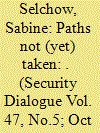

|
|
|
|
|
| Summary/Abstract |
While it is Ulrich Beck’s concept of ‘risk society’ that has mostly attracted attention in the field of security studies, in this article I argue that if we want to take Beck seriously, we need to go beyond his ‘risk society’ thesis and acknowledge that his main thesis was that we live in a social reality that is qualitatively new and, consequently, calls for a radical shift in how we look at and talk about it. To bring Beck into security studies, then, means to study ‘security’ from within Beck’s ‘new world’. For that, I argue, a sharper conception of what characterizes that world is needed. At the heart of my article I provide such a conception – the ‘cosmopolitized world’ – which I identify as being shaped by non-linearity and the interplay of two moments: the ‘cosmopolitized reality’ and the ‘tradition of the national perspective’. Building on this concept and experimenting with it, I turn to reading the ‘US national security’ discourse as this is constructed in the text of the 2015 National Security Strategy from within this ‘cosmopolitized world’. Reflecting on this experiment, I conclude by highlighting the potential that bringing Beck in this way into security studies holds, as well as pointing to the need for future work on the vocabulary of the ‘cosmopolitized world’.
|
|
|
|
|
|
|
|
|
|
|
|
|
|
|
|
| 8 |
ID:
087451
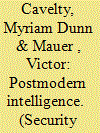

|
|
|
|
|
| Publication |
2009.
|
| Summary/Abstract |
Providing strategic warning to policymakers is a key function of governmental intelligence organizations. Today, globally networked challenges increasingly overshadow their historical state-centric counterparts so that warning has become considerably more difficult. It is recognized in parts of the intelligence community that many of the current problems for warning arise from continued reliance on analytic tools, methodologies and processes that were appropriate to the static and hierarchical nature of the threat during the Cold War. However, even though alternative analysis techniques have begun to be applied, this article argues that the intelligence community could benefit from the understanding that more than just the ontology of threats has changed, that in fact it is in the epistemological area that the most meaningful changes have taken place: Society has seen the replacement of the previous means-end rationality by a reflexive rationality. The notion of reflexive security can provide a valuable conceptual framework for understanding the current changes, and it could be instrumental in adapting intelligence sources and methods to a new era. In particular, an awareness of both complexity sciences and postmodernism might increase understanding of the limitations of knowledge and lead to the establishment of a political discourse of uncertainty.
|
|
|
|
|
|
|
|
|
|
|
|
|
|
|
|
| 9 |
ID:
166975
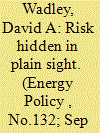

|
|
|
|
|
| Summary/Abstract |
This project probes perceptions of long-standing concern about high voltage electricity overhead transmission lines (HVOTL). Psychometric, cultural and broader risk analysis frameworks permit close examination of homeowners' worries about relevant externalities. Investigated via a telephone survey in Queensland, Australia, the most significant perceptions are hypothesized to relate to technologically-infused risks. Visual effects and noise are the key externalities but shield deeper qualms relating to electric and magnetic fields (EMFs). Safety, environmental damage and property impacts are less feared. Regression analysis indicates that prior knowledge about HVOTLs and a person's residential locale influence risk perception, along with gender and age. The research supports the underlying precepts of a ‘risk society’ while offering significant policy guidelines for infrastructure and associated agencies.
|
|
|
|
|
|
|
|
|
|
|
|
|
|
|
|
| 10 |
ID:
108056
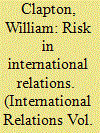

|
|
|
|
|
| Publication |
2011.
|
| Summary/Abstract |
Risk is a concept that has recently filtered through into International Relations (IR). However, the literature on risk, risk management and IR is still comparatively small and there is still significant scope for the theorisation of these concepts in an IR context. Thus far, the literature on risk and IR has been largely characterised by the debate between critical realist, constructivist and post-structuralist approaches to risk. At the core of these debates is the ontological question of whether risks are 'real' or not. However, this article will suggest that these ontological debates have grown stale and are unhelpful to furthering the research agenda on risk and IR. As this article will demonstrate, we need to systematically develop ways for both explaining risk identification, assessment and management -what might be termed 'riskisation' - and why particular forms of risk management emerge in particular situations and not others.
|
|
|
|
|
|
|
|
|
|
|
|
|
|
|
|
|
|
|
|
|